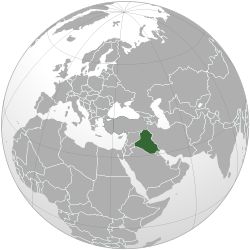Iraq Executes Algerian Jihadi
By Magharebia
By Walid Ramzi
Iraqi authorities carried out an execution of a convicted Algerian jihadist Sunday (October 7th), driving home the cost young people pay when linking up with foreign terrorists.
Algerian Foreign Ministry Spokesperson Amar Belani confirmed the news in a statement published Tuesday (October 9th). The Algerian foreign ministry lamented what it called “a lack of co-operation by Iraqi authorities” in response to requests for information about Algerians in Iraqi prisons, their identities, charges against them, and details about judicial proceedings.

Algerian national Abdallah Ahmed Belhadi was one of 11 terrorists executed after being convicted under Iraq’s anti-terror law. Iraqi authorities justified the move because all legal avenues had been exhausted and the Iraqi president had signed their execution verdicts. The authorities also indicated that steps were taken to make sure these individuals were not wrongfully convicted.
Belhadi hailed from El Oued province south of Algiers. At just 20 years old, he went to Iraq in 2004 and joined an armed group. Belhadi moved to Iraq with his friend Salaheddin Damon, who was killed in a battle in Iraq in 2006.
Belhadi was later arrested, then released two months later only to be arrested again in 2010. The last time his family heard from him was in June 2010. At that time, he conveyed to them the state of his health and that he was fighting in the ranks of one of the armed groups in Iraq.
According to Echorouk, Belhadi’s family was not informed about his whereabouts until they learned about his execution from satellite channels.
Iraqi authorities admit the presence of 14 Algerians in Iraqi prisons, sentenced to terms ranging from 10 to 15 years. At least four other Algerians are in prison in Iraqi Kurdistan.
The Algerian judiciary has recently opened investigations into persons accused of working for a network for recruiting Algerian fighters in Iraq.
“Investigations conducted by the security authorities between 2006 and 2008 showed that there are organisations in Europe that recruit Algerians to carry out operations in Iraq, and that they were specifically targeting young people and university students,” said Kamal Hadef, a journalist specialising in security affairs.
“The investigations revealed that such recruitment networks depend on persuasion and temptation, exploitation of religious discourse and jihadist tone, and on taking advantage of the miserable social conditions,” Hadef added.
Hadef said the terrorist recruiters would focus on fugitives or those who took part in foreign wars because they were easy targets and already had experience.
In her turn, Saida Benhabiles, a rights activist concerned with defending victims of terrorism and a former minister, said that civil society organisations “have tried for years to raise awareness about the danger of recruiting young people to go to states that witness armed conflicts”.
Civil society organisations would work with youths “to urge them to distance themselves from some ideas that try to sow despair in their souls”, Benhabiles said, adding that many were drawn to conflicts because of videos found on the internet.
She added that it was “difficult to counter this issue under the current conditions. Youth recruitment is on-going now, and has taken other destinations towards Syria, Mali and elsewhere”.
Naima Hamdi, president of an association to help youth integration, said that her group used to organise seminars on Algerians going to fight abroad.
“It became crystal clear that some of those young people lack knowledge about what such a decision would lead to,” Hamdi said. “Some of them listen to opinions of unknown source promoted on the internet without knowing the ones who actually express them or the goals behind them.”
“We tried to reveal some facts and we sometimes used religious faqihs (jurists) to respond to some fallacies in those young people’s minds,” Hamdi said.
But she added that these efforts were still insufficient to counter the activities of associations that try “to recruit young people and exploit them in conflicts”.
